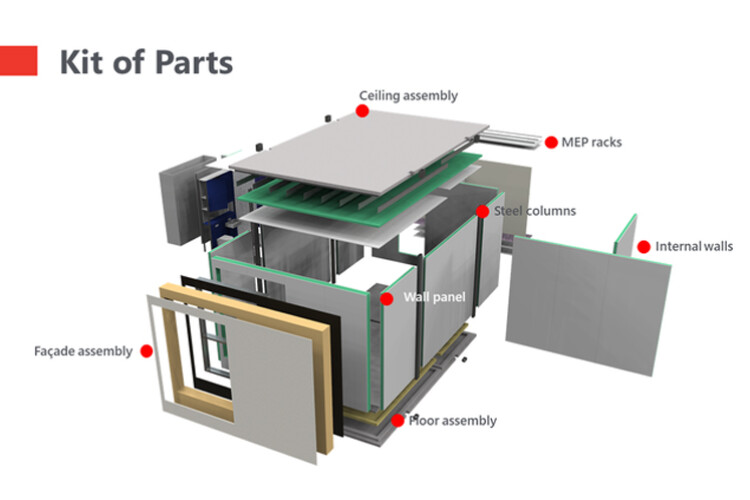Offsite construction is generally considered to be one of the more efficient areas of the industry, but Cemex Ventures – the venture capital arm of materials giant Cemex – thinks there is still a lot of scope for removing inefficiency and waste from the process.
This article was first published in the May 2021 issue of The Construction Index magazine. Sign up online.
The company recently announced that it is investing in London-based start-up business Modulous, which it describes as having a “disruptive offsite construction system” that will help speed up new home building in the UK and beyond.
Cemex Ventures investment manager Mateo Zimmerman says Modulous differs from other offsite companies by combining a digital platform with a kit of parts that enable it to deliver sustainable and affordable homes at scale and pace.
“Their digital platform enables clients to design the building in a fraction of the time before the kit of parts is delivered to and installed by Modulous-trained third-party local assemblers,” he explains.
The world’s urban population is predicted to grow from 4.2 billion to 6.7 billion people by 2050, and in the UK, we are currently building 100,000 fewer units than are needed every year. “The goal is to offer more efficient and sustainable construction, using eco-friendly and reusable materials, improving the energy-efficiency of the buildings, while having a superior quality and reducing construction time,” Zimmerman says.
Modulous was launched in 2018 by a team of architects, engineers and technology experts with experience in the construction industry in the UK, US and Middle East. It differs from other offsite manufacturers in three ways: the kit of parts, decentralised operations and the digital platform.
Having a kit of parts is intended to give clients options while also optimising procurement, assembly, lifting and transportation. Once the design has been finalised and planning approved, these components are shipped to trained assemblers who are local to the project. “This makes it a much more capital-efficient model without the need of building or owning a factory, which can limit the scale of the company,” explains Zimmerman.
The digital platform underpins every aspect of the process, using technologies including artificial intelligence, generative design – which allows different options to be considered very quickly – and 5D BIM modelling. The company also uses this platform to combine planning data, market intelligence and optimised designs to establish if a site is viable and to provide accurate cost plans and delivery dates.
Zimmerman says: “Modulous’ approach not only enables the supply chain to deliver sustainable and high-quality homes, but it also significantly reduces time and costs in the construction process. We believe in the scalability of their solution and look forward to revolutionising the residential development industry alongside them.”

He says Cemex Ventures had been researching and analysing the modular construction trend with great interest for some years when it encountered Modulous, and liked the combination of engineers, designers and technology developers running the business. “They combined in a very complete solution what we had not seen before from other industrialised construction businesses.”
In 2019, Cemex Ventures named Modulous in its first Top 50 Contech Start-ups list, and last year the company was one of the winners of its annual Construction Start-up Competition. “We kept a very close watch at Modulous in the last two years before making the investment,” says Zimmerman.
The investment package includes Cemex UK supplying ready-mix and concrete products to Modulous and linking the firm with Cemex customers worldwide. “Our investment in Modulous supports Cemex’s global vision for offsite construction and enhances future collaborations to launch advanced and tailored materials for it,” Zimmerman explains. “Allowing Modulous to have access to our customers and suppliers gives them an advantage in the industry and allows for speedy growth around the UK and Europe.”
Modulous is currently preparing to deliver a £6.5m residential scheme in London that Zimmerman says will achieve completion 12 months ahead of schedule. “They expect to generate £25m in revenue during this year, while committing to deliver 40,000 homes in the UK during the next five years,” he adds. “They are already working on housing projects across other countries in Europe and, given that their business model is easily scalable, we expect Modulous to keep growing in the region.”
If Cemex Ventures is so committed to offsite construction, why doesn’t Cemex – one of the world’s largest construction materials companies – set up its own modular company? The answer, says Zimmerman, is that it makes more sense to “leverage on Modulous’s innovative outlook and their team’s experience and combine it with Cemex’s resources”.
He adds: “For the UK, we thought it wise to work with them and help their business grow across other countries in Europe where Cemex operates.”
This article was first published in the May 2021 issue of The Construction Index magazine. Sign up online.
Elsewhere, however, the solution might be different. In 2020 Cemex Ventures partnered with a leading Spanish construction and real estate company, and they are now working together to open the country’s first offsite construction company, Wallex.
“It’s safe to say we are betting on industrialised construction from many fronts and expect it to rise in 2021 and future years,” says Zimmerman.
Got a story? Email news@theconstructionindex.co.uk



